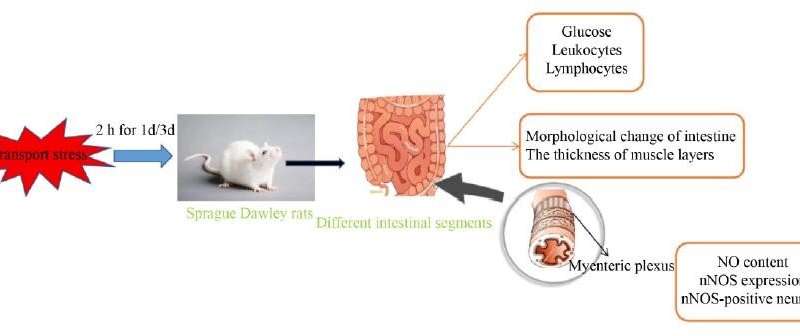Researchers investigate how transport stress affects intestinal health in animals

Animals are often exposed to transport stress, since it is related to a number of complicated factors, such as crowding, temperature, noise, and motion, which can cause weight loss and immunity damage, reduce productivity, and even lead to death in severe cases. It has been found that transport stress can also affect gut health, but the specific molecular mechanisms underlying this effect are not fully understood.
Studies have shown that the hypothalamic-pituitary-adrenal axis promotes elevated serum glucose level and participates in stress responses by secreting glucocorticoids. In addition, the enteric nervous system (ENS), as the largest peripheral nervous system, receives many complex signals from the brain and is composed of different types of neurons and glial cells.
Nitric oxide synthase (NOS) positive neurons as a type of nitroergic neurons expressing different NOS isoforms including endothelial nitric oxide synthase (eNOS), neuronal nitric oxide synthase (nNOS), and inducible nitric oxide synthase (iNOS) in the myenteric plexus of intestine. Nitric oxide (NO), an inhibitory neurotransmitter and second messenger, generated from the NOS catalyzing L-arginine rapidly.
A growing body of evidence indicates that NO could relax gastrointestinal smooth muscle, modulate intestinal blood flow and also participate in the regulation of immune and inflammatory responses, playing an important role in the maintenance of mucosal integrity.
Considering that the expression of nNOS/NO pathway may be affected when animals are exposed to transport stress, and that it regulates intestinal function, Professor Yunfei Ma's team, used constant temperature shaker that provided vibrations to imitate transport stress in a rat model to investigate the effects of transport stress on immune function and intestinal morphology of rats. The team further elucidated the molecular mechanism of nNOS/NO signaling of the ENS involved in this process.
The study found that in the S1d group, rats exhibited increased serum glucose and diminished lymphocytes, including leukocyte levels. Moreover, compared to the S3d group, more severe damage to intestinal morphology was revealed in the S1d group. Notably, although S3d group showed less morphological damage than S1d group, the expression of nNOS and the number of NOS-positive neurons in the myenteric plexus of the intestine more obviously continued to decrease during transport stress, reaching lowest levels in S3d group.
Furthermore, considering that the different intestinal tissues of rats exert different physiological functions, the authors further investigated the effects of transport stress on the duodenum, jejunum and colon, and found that transport stress caused less impairment to colon tissue. This study indicated that during the transport stress, ENS was activated initiating the gut-brain signaling pathway in animals, which together affected intestinal homeostasis.
This study demonstrated that transport stress induced intestinal injury and elucidated potential mechanisms by which the decline of NOS-positive neurons and nNOS expression was involved in regulating the process of transport stress. Therefore, modulation of nNOS expression may be an effective therapeutic approach to alleviate transport stress-induced intestinal injury.
Future interventions might include the use of nNOS agonists, supplementation with beneficial microbiota, and control of transport distance and duration to enhance animal immunity, promote gut health, improve meat quality and safety, and ultimately increase the economic benefits of livestock production.
This study, titled "Effects of transport stress on the intestines involving neuronal nitric oxide synthase," has been published in Frontiers of Agricultural Science and Engineering.
More information:
Effects of Transport Stress on The Intestines Involving Neuronal Nitric Oxide Synthase, Frontiers of Agricultural Science and Engineering (2022). DOI: 10.15302/J-FASE-2022469
Provided by Frontiers Journals